外研版英语八年级下册Module 2 Experiences Unit 3 Language in use课件(30张PPT)
文档属性
| 名称 | 外研版英语八年级下册Module 2 Experiences Unit 3 Language in use课件(30张PPT) | 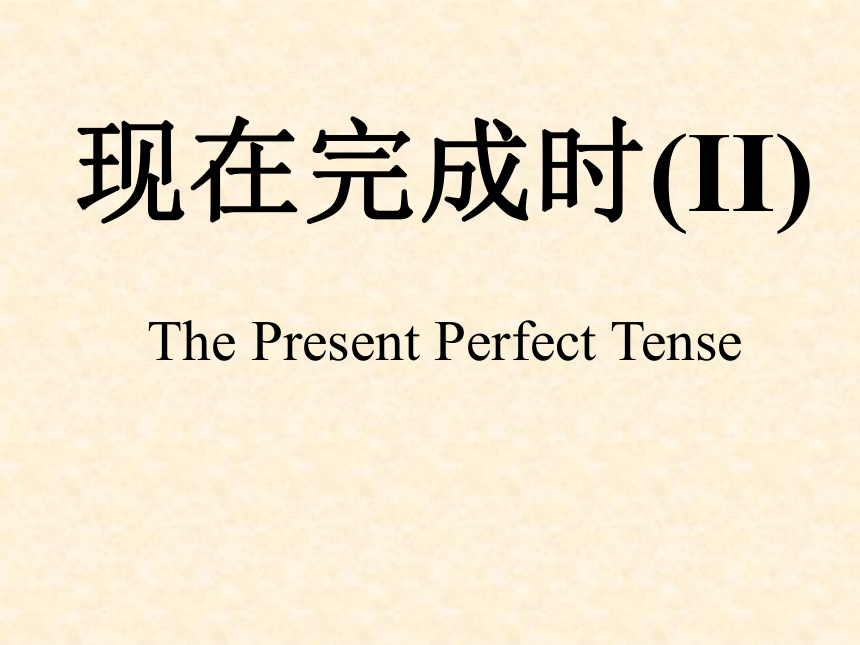 | |
| 格式 | ppt | ||
| 文件大小 | 600.9KB | ||
| 资源类型 | 教案 | ||
| 版本资源 | 外研版 | ||
| 科目 | 英语 | ||
| 更新时间 | 2021-03-10 17:33:09 | ||
图片预览


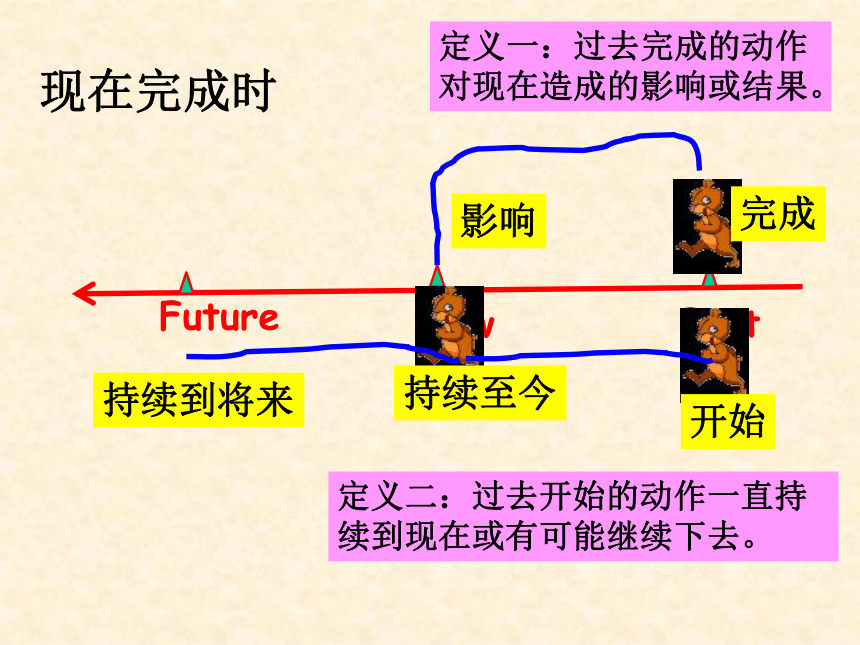
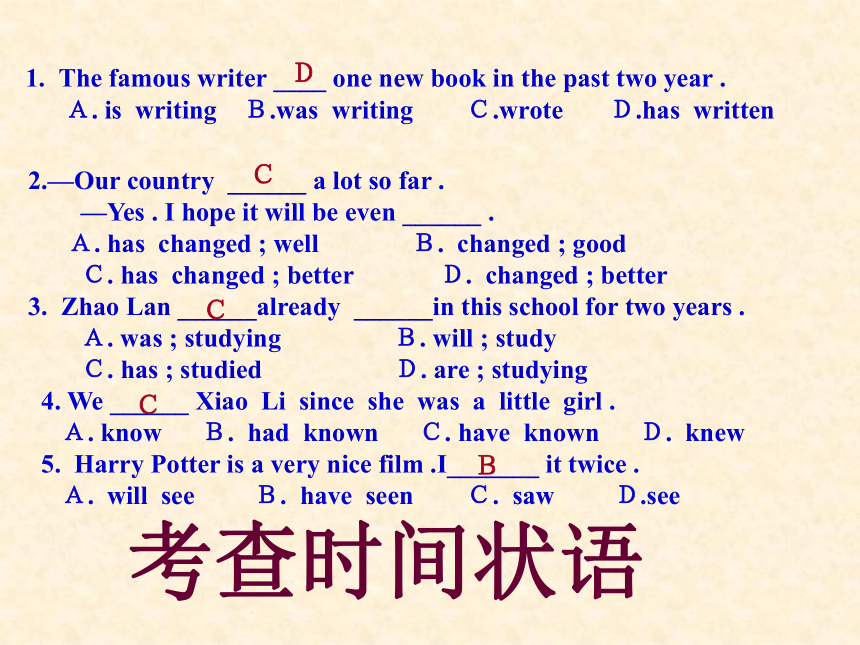
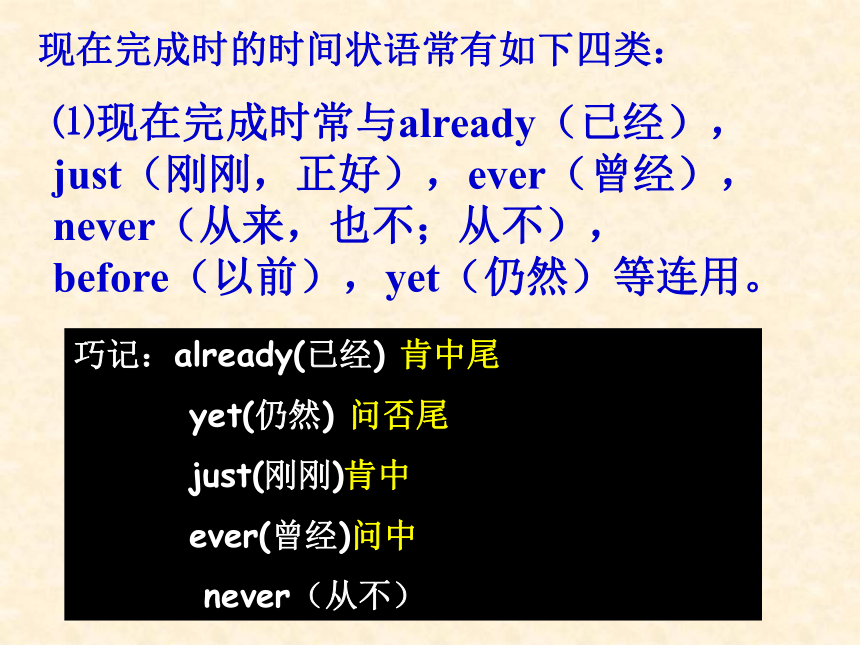
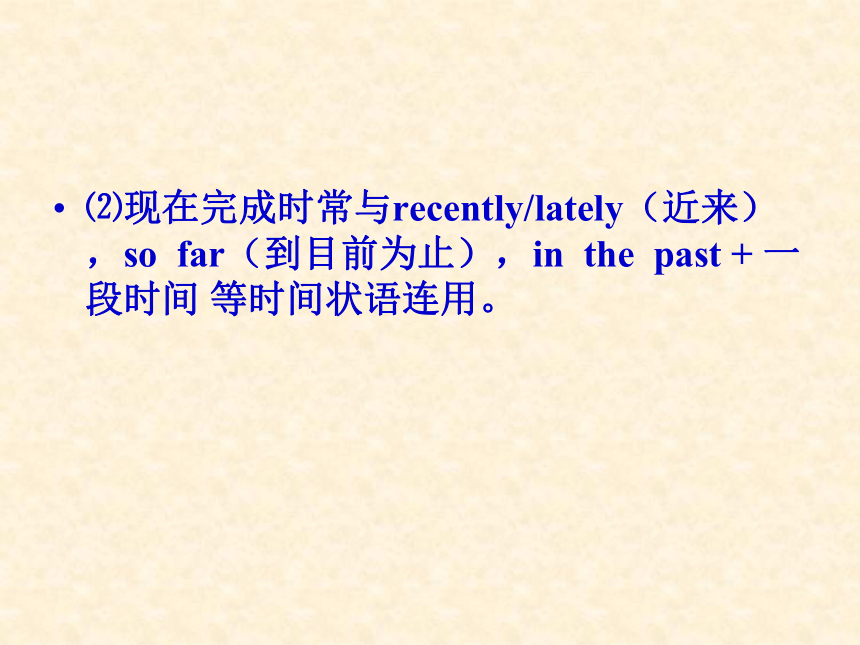
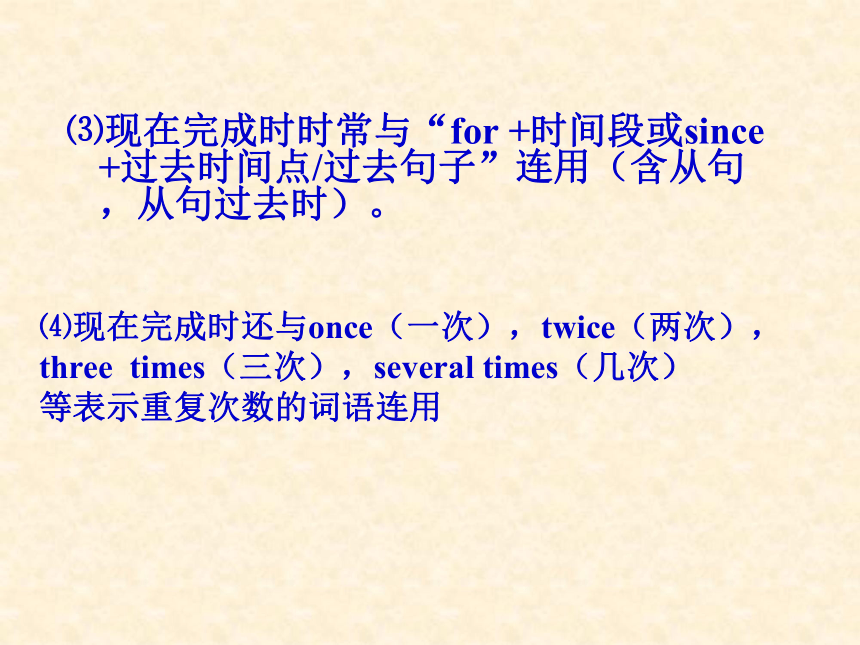
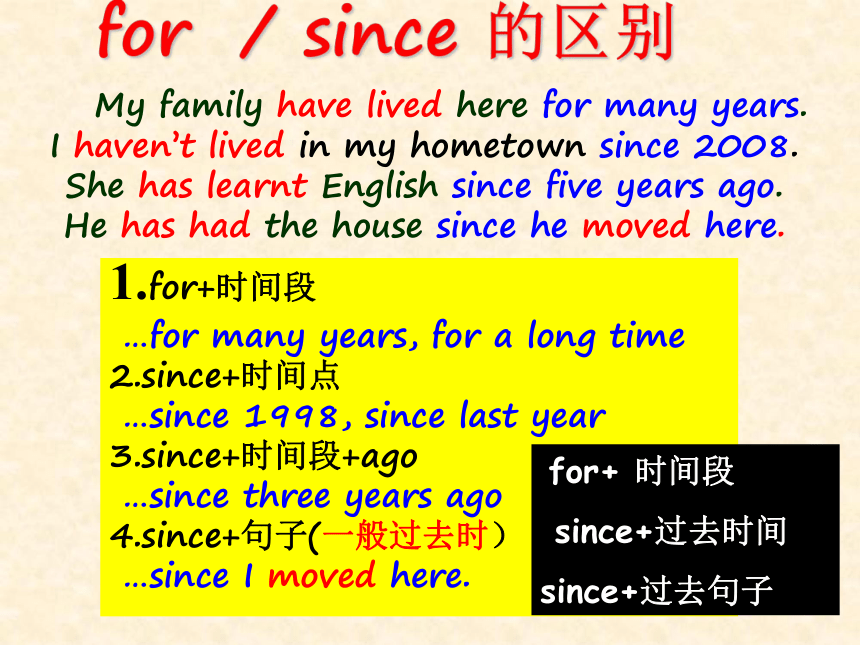

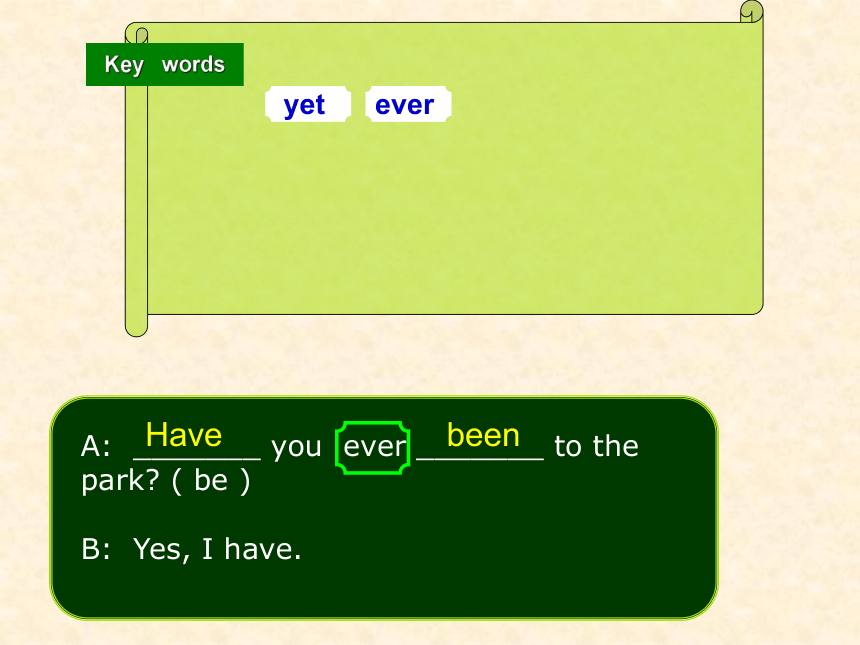
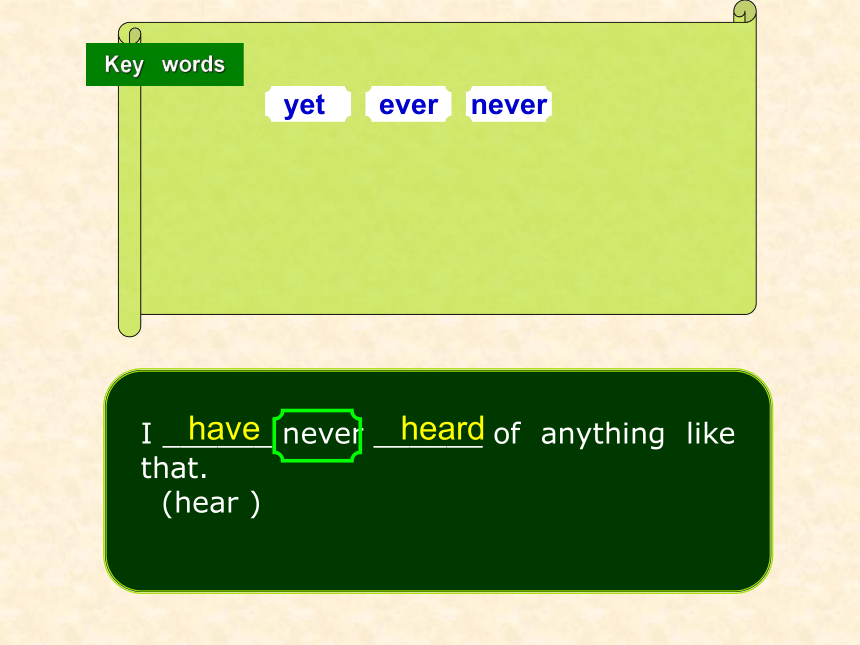
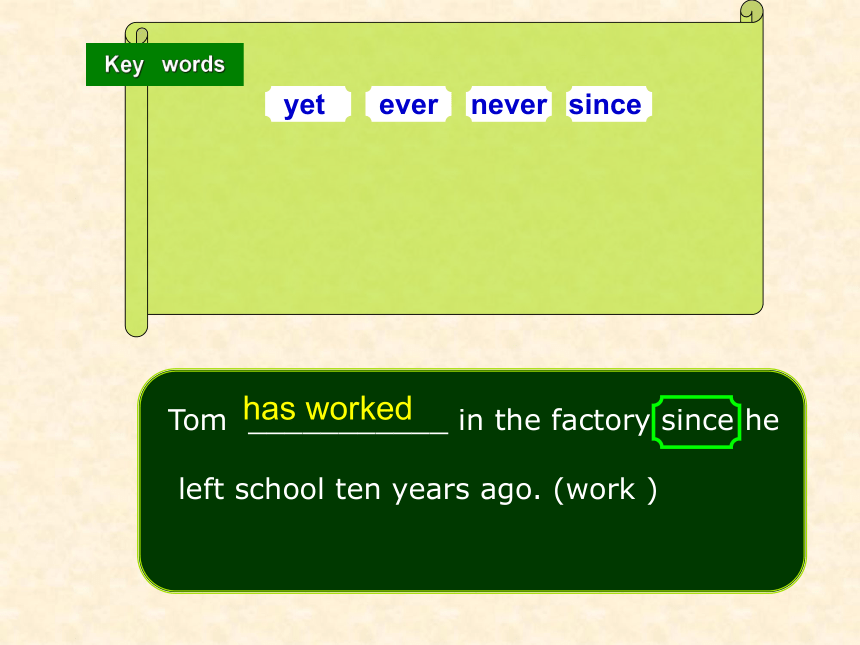
文档简介
现在完成时(II)
The Present Perfect Tense
教学目标:
1.掌握现在完成时的标志性时间状语。
2.区别现在完成时与一般过去。
3.掌握have/has been to, have/has gone to,
have/has been in.
Past
Now
Future
完成
影响
开始
持续至今
持续到将来
定义一:过去完成的动作对现在造成的影响或结果。
定义二:过去开始的动作一直持续到现在或有可能继续下去。
现在完成时
1. The famous writer ____ one new book in the past two year .
A. is writing B.was writing C.wrote D.has written
2.—Our country ______ a lot so far .
—Yes . I hope it will be even ______ .
A. has changed ; well B. changed ; good
C. has changed ; better D. changed ; better
3. Zhao Lan ______already ______in this school for two years .
A. was ; studying B. will ; study
C. has ; studied D. are ; studying
4. We ______ Xiao Li since she was a little girl .
A. know B. had known C. have known D. knew
5. Harry Potter is a very nice film .I_______ it twice .
A. will see B. have seen C. saw D.see
D
C
C
C
B
考查时间状语
现在完成时的时间状语常有如下四类:
巧记:already(已经) 肯中尾
yet(仍然) 问否尾
just(刚刚)肯中
ever(曾经)问中
never(从不)
⑴现在完成时常与already(已经),
just(刚刚,正好),ever(曾经),
never(从来,也不;从不),
before(以前),yet(仍然)等连用。
⑵现在完成时常与recently/lately(近来),so far(到目前为止),in the past + 一段时间 等时间状语连用。
⑶现在完成时时常与“for +时间段或since +过去时间点/过去句子”连用(含从句,从句过去时)。
⑷现在完成时还与once(一次),twice(两次),
three times(三次),several times(几次)
等表示重复次数的词语连用
for / since 的区别
1.for+时间段
…for many years, for a long time
2.since+时间点
…since 1998, since last year
3.since+时间段+ago
…since three years ago
4.since+句子(一般过去时)
…since I moved here.
My family have lived here for many years.
I haven’t lived in my hometown since 2008.
She has learnt English since five years ago.
He has had the house since he moved here.
for+ 时间段
since+过去时间
since+过去句子
A: ______ your brother _________ a new watch? (buy )
B: Not yet.
Key words
Has bought
yet
二、
A: _______ you ever _______ to the park? ( be )
B: Yes, I have.
Key words
Have been
yet
ever
I ______ never ______ of anything like that.
(hear )
Key words
have heard
yet
ever
never
Tom ___________ in the factory since he
left school ten years ago. (work )
Key words
has worked
yet
ever
never
since
A: How long ______ you ________ in this school? (teach )
B: For 6 years.
Key words
have taught
yet
ever
never
since
for
I ______ just ________ the desk, you
can take it to your classroom . (mend )
Key words
have mended
yet
ever
never
since
for
just
_______ you _______ the Forbidden City
(紫禁城) before ? (visit )
Key words
Have visited
yet
ever
never
since
for
just
before
He ____ already ______ a job. (find)
Key words
has found
yet
ever
never
since
for
just
before
already
We _______ only ____________ the first
five questions so far. (discuss )
Key words
have discussed
yet
ever
never
since
for
just
before
already
so far
They ______________over 20,000 fruit
trees up to now . (plant )
Key words
have planted
yet
ever
never
since
for
just
before
already
so far
up to now
Great changes _________________ in
Beijing in the past 10 years. (take place )
Key words
have taken place
yet
ever
never
since
for
just
before
already
so far
up to now
in the past 10 years
He __________ a lot of good things
in his life. (do )
Key words
has done
yet
ever
never
since
for
just
before
already
so far
up to now
in the past 10 years
in his life
I ____________ her lately. ( not see )
Key words
haven’t seen
yet
ever
never
since
for
just
before
already
so far
up to now
in the past 10 years
in his life
lately
I _________________ him recently.
(not hear from )
Key words
haven’t heard from
yet
ever
never
since
for
just
before
already
so far
up to now
in the past 10 years
in his life
lately
recently
He ___________ in this city
ever since then. (live )
Key words
has lived
yet
ever
never
since
for
just
before
already
so far
up to now
in the past 10 years
in his life
lately
recently
ever since then
He ___________ in this high
school till now. (teach )
Key words
has taught
yet
ever
never
since
for
just
before
already
so far
up to now
in the past 10 years
in his life
lately
recently
ever since then
till now
门禁卡 、】】】】】】】
have met
have played
has cooked
have studied
have seen
haven’t visited
haven’t done
用法小窍门:描述过去的动作,若句中有yesterday , last week, three days ago, in 1996等过去具体时间就一定用一般过去时。若 没有,常用现在完成时。所以When问句不能用现在完成时。When 询问的是具体时间。
A:Have you finished your homework yet?
B: Yes, I have.
A: When did you finish it?
B: Yesterday evening.
1.He ____________(work) out the math and now he is explaining it to us.
2.He ______(come) to our school last year.
3.They ___________(cook) the supper already.They ________(cook) it half an hour ago.
4.They _____________ (not buy) the air tickets. They__________(buy) them tomorrow.
has worked
came
have cooked
cooked
haven’t bought
will buy
我能行
have been to 曾经去过某地(已返回)
have gone to 去了某地 (还没有回来)
A
B
A
B
have been in 在某地呆了多长时间”,
常与表示时间的状语连用
考查词组have/has been in / to与have/has gone to的区别:
例1. Miss Green isn‘t in the office . she_______ to the library .
A.has gone B. went C.will go D. has been
例2. My parents ______ Shandong for ten years .
A. have been in B. have been to
C. have gone to D.have been
简析:“have/has gone to + 地点”表示“某人去了某地(还未回来)”,指主语所指的人不在这儿。“have/has been in + 地点”表示“在某地呆了多长时间”,常与表示时间的状语连用。“have/has been to +地点”表示“曾经去过某地(但现在已不在那儿)。”故例1、2的正确答案皆为A。
A
A
单项选择
1.——Have you had your lunch_____?
——Yes, I have.
A. already B.yet C.ever D. since
2.——_____ you _____ to a water park?
A. Have ; gone B.Have ; been C.Has; been D.Has; gone
3.We______her such an interesting story before.
A.told B.have told C.tell D.are telling
4.He_____ been to Shanghai.He _____ there last year.
A.has;has gone B.has; go C.has; went D.have; went
5.He hasn’t been to Beijing.He ______ there next year.
A.goes B. went C.will go D. has been to
B
B
B
C
C
6. I’ve skated __ three hours today.
A. about B. for C. since D. in
7. We’ve studied English __ two years ago.
A. for B. from C. since D. at
8. She has worked in the company since she __ here.
A. has come B. came C. comes D. will come
9. Sam __ that bike for five years.
A. has bought B.had C. has had D. bought
10. -How long have we __ the radio? - For two weeks.
A. borrowed B. kept C. lent D.have borrowed
B
C
B
C
B
The Present Perfect Tense
教学目标:
1.掌握现在完成时的标志性时间状语。
2.区别现在完成时与一般过去。
3.掌握have/has been to, have/has gone to,
have/has been in.
Past
Now
Future
完成
影响
开始
持续至今
持续到将来
定义一:过去完成的动作对现在造成的影响或结果。
定义二:过去开始的动作一直持续到现在或有可能继续下去。
现在完成时
1. The famous writer ____ one new book in the past two year .
A. is writing B.was writing C.wrote D.has written
2.—Our country ______ a lot so far .
—Yes . I hope it will be even ______ .
A. has changed ; well B. changed ; good
C. has changed ; better D. changed ; better
3. Zhao Lan ______already ______in this school for two years .
A. was ; studying B. will ; study
C. has ; studied D. are ; studying
4. We ______ Xiao Li since she was a little girl .
A. know B. had known C. have known D. knew
5. Harry Potter is a very nice film .I_______ it twice .
A. will see B. have seen C. saw D.see
D
C
C
C
B
考查时间状语
现在完成时的时间状语常有如下四类:
巧记:already(已经) 肯中尾
yet(仍然) 问否尾
just(刚刚)肯中
ever(曾经)问中
never(从不)
⑴现在完成时常与already(已经),
just(刚刚,正好),ever(曾经),
never(从来,也不;从不),
before(以前),yet(仍然)等连用。
⑵现在完成时常与recently/lately(近来),so far(到目前为止),in the past + 一段时间 等时间状语连用。
⑶现在完成时时常与“for +时间段或since +过去时间点/过去句子”连用(含从句,从句过去时)。
⑷现在完成时还与once(一次),twice(两次),
three times(三次),several times(几次)
等表示重复次数的词语连用
for / since 的区别
1.for+时间段
…for many years, for a long time
2.since+时间点
…since 1998, since last year
3.since+时间段+ago
…since three years ago
4.since+句子(一般过去时)
…since I moved here.
My family have lived here for many years.
I haven’t lived in my hometown since 2008.
She has learnt English since five years ago.
He has had the house since he moved here.
for+ 时间段
since+过去时间
since+过去句子
A: ______ your brother _________ a new watch? (buy )
B: Not yet.
Key words
Has bought
yet
二、
A: _______ you ever _______ to the park? ( be )
B: Yes, I have.
Key words
Have been
yet
ever
I ______ never ______ of anything like that.
(hear )
Key words
have heard
yet
ever
never
Tom ___________ in the factory since he
left school ten years ago. (work )
Key words
has worked
yet
ever
never
since
A: How long ______ you ________ in this school? (teach )
B: For 6 years.
Key words
have taught
yet
ever
never
since
for
I ______ just ________ the desk, you
can take it to your classroom . (mend )
Key words
have mended
yet
ever
never
since
for
just
_______ you _______ the Forbidden City
(紫禁城) before ? (visit )
Key words
Have visited
yet
ever
never
since
for
just
before
He ____ already ______ a job. (find)
Key words
has found
yet
ever
never
since
for
just
before
already
We _______ only ____________ the first
five questions so far. (discuss )
Key words
have discussed
yet
ever
never
since
for
just
before
already
so far
They ______________over 20,000 fruit
trees up to now . (plant )
Key words
have planted
yet
ever
never
since
for
just
before
already
so far
up to now
Great changes _________________ in
Beijing in the past 10 years. (take place )
Key words
have taken place
yet
ever
never
since
for
just
before
already
so far
up to now
in the past 10 years
He __________ a lot of good things
in his life. (do )
Key words
has done
yet
ever
never
since
for
just
before
already
so far
up to now
in the past 10 years
in his life
I ____________ her lately. ( not see )
Key words
haven’t seen
yet
ever
never
since
for
just
before
already
so far
up to now
in the past 10 years
in his life
lately
I _________________ him recently.
(not hear from )
Key words
haven’t heard from
yet
ever
never
since
for
just
before
already
so far
up to now
in the past 10 years
in his life
lately
recently
He ___________ in this city
ever since then. (live )
Key words
has lived
yet
ever
never
since
for
just
before
already
so far
up to now
in the past 10 years
in his life
lately
recently
ever since then
He ___________ in this high
school till now. (teach )
Key words
has taught
yet
ever
never
since
for
just
before
already
so far
up to now
in the past 10 years
in his life
lately
recently
ever since then
till now
门禁卡 、】】】】】】】
have met
have played
has cooked
have studied
have seen
haven’t visited
haven’t done
用法小窍门:描述过去的动作,若句中有yesterday , last week, three days ago, in 1996等过去具体时间就一定用一般过去时。若 没有,常用现在完成时。所以When问句不能用现在完成时。When 询问的是具体时间。
A:Have you finished your homework yet?
B: Yes, I have.
A: When did you finish it?
B: Yesterday evening.
1.He ____________(work) out the math and now he is explaining it to us.
2.He ______(come) to our school last year.
3.They ___________(cook) the supper already.They ________(cook) it half an hour ago.
4.They _____________ (not buy) the air tickets. They__________(buy) them tomorrow.
has worked
came
have cooked
cooked
haven’t bought
will buy
我能行
have been to 曾经去过某地(已返回)
have gone to 去了某地 (还没有回来)
A
B
A
B
have been in 在某地呆了多长时间”,
常与表示时间的状语连用
考查词组have/has been in / to与have/has gone to的区别:
例1. Miss Green isn‘t in the office . she_______ to the library .
A.has gone B. went C.will go D. has been
例2. My parents ______ Shandong for ten years .
A. have been in B. have been to
C. have gone to D.have been
简析:“have/has gone to + 地点”表示“某人去了某地(还未回来)”,指主语所指的人不在这儿。“have/has been in + 地点”表示“在某地呆了多长时间”,常与表示时间的状语连用。“have/has been to +地点”表示“曾经去过某地(但现在已不在那儿)。”故例1、2的正确答案皆为A。
A
A
单项选择
1.——Have you had your lunch_____?
——Yes, I have.
A. already B.yet C.ever D. since
2.——_____ you _____ to a water park?
A. Have ; gone B.Have ; been C.Has; been D.Has; gone
3.We______her such an interesting story before.
A.told B.have told C.tell D.are telling
4.He_____ been to Shanghai.He _____ there last year.
A.has;has gone B.has; go C.has; went D.have; went
5.He hasn’t been to Beijing.He ______ there next year.
A.goes B. went C.will go D. has been to
B
B
B
C
C
6. I’ve skated __ three hours today.
A. about B. for C. since D. in
7. We’ve studied English __ two years ago.
A. for B. from C. since D. at
8. She has worked in the company since she __ here.
A. has come B. came C. comes D. will come
9. Sam __ that bike for five years.
A. has bought B.had C. has had D. bought
10. -How long have we __ the radio? - For two weeks.
A. borrowed B. kept C. lent D.have borrowed
B
C
B
C
B
同课章节目录
- Module 1 Feelings and impressions
- Unit 1 It smells delicious.
- Unit 2 I feel nervous when I speak Chinese .
- Unit 3 Language in use
- Module 2 Experiences
- Unit 1 I've also entered lots of speaking competi
- Unit 2 They have seen the Pyramids.
- Unit 3 Language in use
- Module 3 Journey to space
- Unit 1 Has it arrived yet?
- Unit 2 We have not found life on any other planet
- Unit 3 Language in use
- Module 4 Seeing the docto
- Unit 1 I haven't done much exercise since I got m
- Unit 2 We have played football for a year now
- Unit 3 Language in use
- Module 5 Cartoons
- Unit 1 It's time to watch a cartoon.
- Unit 2 Tintin has been popular for over eighty yea
- Unit 3 Language in use
- Revision module A
- Module 6 Hobbies
- Unit 1 Do you collect anything ?
- Unit 2 Hobbies can make you grow as a person.
- Unit 3 Language in use
- Module 7 Summer in Los Angeles
- Unit 1 Please write to me and send me some photos
- Unit 2 Fill out a form and come to learn English
- Unit 3 Language in use
- Module 8 Time off
- Unit 1 I can hardly believe we are in the city ce
- Unit 2 We thought somebody was moving about
- Unit 3 Language in use
- Module 9 Friendship
- Unit 1 Could I ask if you've mentioned this to he
- Unit 2 I believe that the world is what you think
- Unit 3 Language in use
- Module 10 On the radio
- Unit 1 I hope that you can join us one day
- Unit 2 It seemed that they were speaking to me in
- Unit 3 Language in use
- Revision module B
